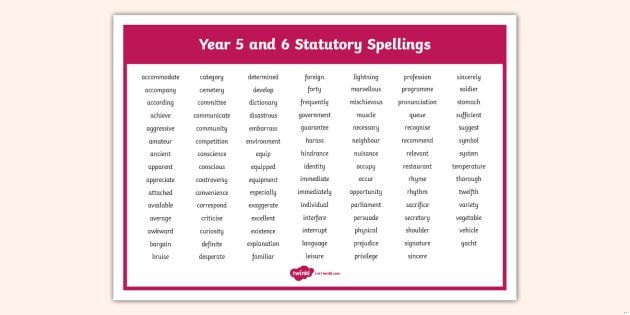Finding the right year 5/6 spelling list can make a significant difference in a child’s learning journey. These lists are tailored to help students enhance their spelling skills while preparing them for more complex words.
Incorporating these words into daily practice builds confidence and solidifies understanding. As students engage with the year 5/6 spelling list, they not only improve their spelling but also enrich their vocabulary. Let’s delve into some effective strategies and resources to make spelling enjoyable and impactful.
Year 5/6 Spelling List: Essential Words for Young Learners
Every year, students in Year 5 and Year 6 encounter a range of new vocabulary as they progress in their education. The Year 5/6 spelling list typically includes words that challenge students, enhance their language skills, and better prepare them for secondary education. Understanding the importance of spelling and having access to a comprehensive spelling list can make a significant difference in a child’s learning journey.
The Importance of Spelling in Years 5 and 6
Spelling plays a crucial role in a child’s education, particularly during the Year 5 and Year 6 phases. Here’s why it matters:
- Enhances Writing Skills: Correct spelling increases the clarity of writing. When students spell words correctly, their writing becomes more effective and easier to understand.
- Builds Vocabulary: Learning to spell challenging words aids in expanding vocabulary. A larger vocabulary allows children to express themselves more clearly and creatively.
- Improves Reading Ability: Spelling and reading are interconnected. Recognizing how words are spelled helps students decode and pronounce words while reading.
- Boosts Confidence: Mastery of spelling can significantly enhance a child’s confidence during written assignments and oral presentations.
Key Topics in Year 5/6 Spelling Lists
Year 5 and Year 6 spelling lists often focus on several key areas. Here are some of the essential topics covered during these years:
Commonly Misspelled Words
Students frequently encounter certain words that challenge them. Here are some common words that often appear on Year 5/6 spelling lists:
- accommodate
- definitely
- independent
- necessary
- receive
- separate
- weird
Having a focused approach to these commonly misspelled words helps students become more proficient in spelling.
Homophones and Homographs
Understanding homophones (words that sound the same but have different meanings) and homographs (words that are spelled the same but have different meanings) is essential for Year 5/6 students. Some examples include:
- Homophones:
- to, too, two
- there, their, they’re
- Homographs:
- lead (to guide) vs. lead (a metal)
- tear (to rip) vs. tear (a drop of liquid from the eye)
Focusing on these can help students understand context and meaning in their writing and reading.
Prefixes and Suffixes
Learning about prefixes and suffixes can enhance spelling skills significantly. Here are some commonly used prefixes and suffixes:
- Prefixes:
- un- (meaning “not,” e.g., unhappy, unkind)
- re- (meaning “again,” e.g., redo, rewrite)
- mis- (meaning “wrong,” e.g., misunderstand, misplace)
- Suffixes:
- -ly (turning adjectives into adverbs, e.g., happy → happily)
- -ful (full of, e.g., joyful, hopeful)
- -tion (forming nouns, e.g., education, celebration)
By learning these components, students can tackle new words with more confidence.
Strategies for Learning the Year 5/6 Spelling List
Learning spelling lists can sometimes feel overwhelming. However, there are engaging and effective strategies parents and teachers can employ to make spelling more enjoyable:
Games and Activities
Incorporating games into spelling practice can make learning fun. Here are a few ideas:
- Spelling Bee: Organizing a friendly competition where students spell out words can encourage them to practice.
- Word Scramble: Create a word scramble game from the spelling list, where students have to unscramble letters to form words.
- Flashcards: Use flashcards for repeated exposure. Write the word on one side and its definition on the other.
Visual Aids
Visual learning can significantly help students who may struggle with spelling. Consider these tools:
- Word Walls: Create a word wall in the classroom or at home that features the Year 5/6 spelling words prominently.
- Charts: Use charts to categorize words based on their prefixes, suffixes, or common themes.
- Color Coding: Color-code words to differentiate between parts of speech or word families.
Practice and Repetition
Repetition is a key component in learning. Consider these helpful practices:
- Daily Practice: Encourage daily spelling practice, even if it’s just for 10-15 minutes.
- Writing Sentences: Have students write sentences using their spelling words to reinforce their learning.
- Weekly Quizzes: Regular quizzes can help gauge understanding and retention.
Spelling Tests: Preparation and Execution
Testing spelling knowledge is essential for evaluating progress. Here’s how to effectively prepare for spelling tests:
Preparation Techniques
Before a spelling test, students can engage in various preparation activities:
- Review Lists: Go over the spelling list multiple times, focusing on the more challenging words.
- Practice Writing: Write each word multiple times to help reinforce memory.
- Peer Teaching: Have students teach each other the spelling list words, reinforcing their knowledge.
During the Test
The environment during a spelling test can impact performance. Consider the following tips:
- Quiet Space: Ensure a quiet and comfortable testing environment to minimize distractions.
- Clear Instructions: Provide clear instructions on how the test will be conducted.
- Encourage Calmness: Remind students to take deep breaths and stay calm during the test.
Building Confidence Through Spelling
Confidence in spelling can lead to improved performance in both writing and reading tasks. Here are ways to bolster a student’s confidence:
- Positive Reinforcement: Celebrate successes, big or small. Praise efforts as well as achievements.
- Setting Goals: Set achievable spelling goals to ensure continuous improvement.
- Encourage Independent Learning: Allow students to explore new words and practice outside of class hours.
Utilizing Technology for Spelling Practice
In today’s digital age, technology can play a significant role in enhancing spelling skills. Consider these resources:
- Spelling Apps: Numerous mobile apps are available that turn spelling practice into engaging games.
- Online Games: Websites offer interactive spelling games, quizzes, and challenges tailored for Year 5/6 learners.
- Digital Flashcards: Use apps that allow for easy customization of flashcards for spelling practice.
Parental Involvement in Spelling Education
Parental support can greatly enhance a child’s learning experience. Here are ways parents can assist with spelling:
- Daily Reading: Encourage children to read daily. This activity introduces them to new words and reinforces spelling.
- Practice at Home: Engage in spelling activities during family time, making it a fun bonding experience.
- Encouragement: Always encourage children, reminding them that mistakes are part of the learning process.
By collaborating with teachers and using tools and strategies mentioned above, parents can support their children effectively in their spelling journey.
As students navigate through Year 5 and Year 6, a comprehensive understanding of spelling is vital. A well-structured spelling list serves as a foundation for developing writing skills, enhancing vocabulary, and cultivating confident readers. Continuous practice, engaging activities, and parental involvement create an atmosphere where students can thrive and enjoy learning. Whether through games, technology, or personal connections, the journey through spelling can be an exciting adventure filled with growth and achievement.
Year 5 Spelling:Year 5 & 6 Word List
Frequently Asked Questions
“`html
What are the benefits of learning the Year 5/6 spelling list?
Learning the Year 5/6 spelling list helps students improve their reading and writing skills. It enhances their vocabulary and builds confidence in expressing their thoughts. By mastering these spellings, students can better understand complex texts and communicate more effectively in both spoken and written forms.
How can parents support their children with the Year 5/6 spelling list?
Parents can support their children by creating a positive learning environment at home. They can encourage regular practice through fun activities like spelling games, quizzes, and writing exercises. Reading together and discussing new words also reinforces spelling skills. Setting aside a specific time for spelling practice can help establish a routine.
Are there specific strategies for memorizing the words on the Year 5/6 spelling list?
Yes, several strategies can help with memorization. Breaking words into smaller parts, using flashcards, and writing the words multiple times can be effective. Additionally, creating mnemonic devices or associating words with images can aid memory retention. Regular review and practice will strengthen recall of the words.
How often should students practice the Year 5/6 spelling list?
Students should aim to practice the spelling list daily or several times a week. Consistent practice ensures better retention and mastery of the words. Short, focused practice sessions tend to be more effective than long, infrequent sessions. Incorporating spelling practice into daily activities, such as writing or reading, can also be beneficial.
What should educators focus on when teaching the Year 5/6 spelling list?
Educators should focus on the meaning and usage of each word, not just the spelling itself. Encouraging students to use the words in sentences will deepen their understanding. Additionally, integrating spelling into various subjects can make learning more engaging and relevant. Providing constructive feedback and celebrating progress can motivate students to improve.
“`
Final Thoughts
In summary, the year 5/6 spelling list provides essential vocabulary that enhances students’ writing and reading skills. Regular practice with these words can boost confidence and academic performance.
Parents and educators can support this learning by incorporating fun activities and games related to the spelling list. Engaging with these words in various contexts helps reinforce their understanding and retention.
Overall, focusing on the year 5/6 spelling list not only aids in spelling but also enriches students’ overall language development.




